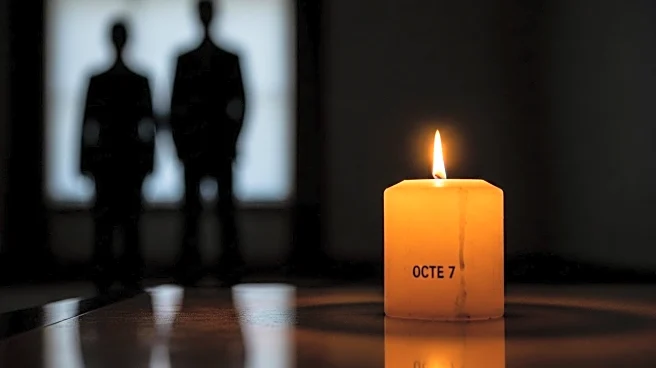What's Happening?
The Israeli government has announced a change in the official commemoration of the Oct. 7 anniversary of Hamas's deadly attacks. This year, the remembrance will be observed on the Hebrew calendar date, the 24th of Tishrei, which falls on Oct. 16, rather than the Gregorian date of Oct. 7. Two state ceremonies will be held at Mount Herzl in Jerusalem on Oct. 16, one to honor fallen soldiers and another for civilians killed in the attacks. Meanwhile, a nonprofit organization, KUMI, led by Yonatan Shamriz, whose brother was killed in the attacks, is organizing a separate memorial on Oct. 7. This event will feature performances by prominent Israeli artists and will be broadcast live. KUMI has successfully raised funds through crowdfunding to support the event.
Why It's Important?
The decision to shift the official memorial date reflects the government's approach to balancing national remembrance with religious observance. This move may affect public sentiment and participation in the memorial activities. The separate tribute organized by KUMI highlights the role of civil society in commemorating significant events, potentially influencing public discourse and community engagement. The involvement of well-known artists in the KUMI event underscores the cultural impact and the importance of collective memory in Israeli society. The successful crowdfunding campaign indicates strong public support for alternative forms of remembrance.
What's Next?
The government and KUMI's separate memorials may lead to discussions on how national tragedies are commemorated and the role of religious versus secular observance. The public's response to these events could influence future decisions on official memorial practices. Additionally, the success of KUMI's crowdfunding campaign might encourage other organizations to seek public funding for similar initiatives, potentially altering the landscape of public commemoration in Israel.
Beyond the Headlines
The shift in memorial dates raises questions about the intersection of religion and state in Israel, particularly in how national events are observed. This decision may prompt debates on the inclusivity of state ceremonies and the representation of diverse community perspectives. The involvement of civil society in organizing memorials could lead to increased advocacy for broader participation in national remembrance activities, potentially reshaping cultural and social norms around commemoration.










